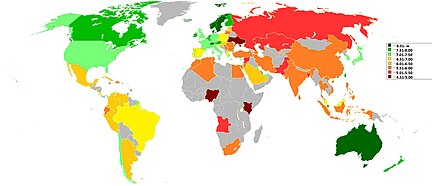Where-to-be-born Index
This article needs to be updated. (April 2017) |

The where-to-be-born index, formerly known as the quality-of-life index (QLI), was last published by the Economist Intelligence Unit (EIU) in 2013. Its purpose was to assess which country offered the most favorable conditions for a healthy, secure, and prosperous life in the years following its release.[1]
It was based on a method that combines the results of subjective life-satisfaction surveys with the objective determinants of quality of life across countries as well as forecasts for economic growth.
Methodology
[edit]In 2013, an index was created using data from 80 countries and territories. The survey considered ten quality-of-life factors and future GDP per capita forecasts to determine each nation’s score.[2] Switzerland, Australia, and Norway topped the list with scores just above 8.[3]
Back in 2006, life satisfaction scores (rated on a scale of 1 to 10) for 130 countries (from the Gallup Poll) were analyzed through multivariate regression. Researchers identified 11 statistically significant indicators that explained about 85% of the variation in life satisfaction scores across countries. These predicted scores represent a country’s quality of life index, with coefficients automatically weighing the importance of different factors. The estimated equation from 2006 allows for comparisons over time and across nations.[4]
The independent variables in the estimating equation for 2006 include:
- Material well-being as measured by GDP per capita (in USD, at 2006 constant PPPS)
- Life expectancy at birth
- The quality of family life based primarily on divorce rates
- The state of political freedoms
- Job security (measured by the unemployment rate)
- Climate (measured by two variables: the average deviation of minimum and maximum monthly temperatures from 14 degrees Celsius; and the number of months in the year with less than 30mm rainfall)
- Personal physical security ratings (based primarily on recorded homicide rates and ratings for risk from crime and terrorism)
- Quality of community life (based on membership in social organizations)
- Governance (measured by ratings for corruption)
- Gender equality (measured by the share of women holding seats in national Houses of Assembly)
- Divorce rates
See also
[edit]Measurement and metrics
[edit]Indices
[edit]- Canadian Index of Wellbeing
- Bhutan GNH Index
- Broad measures of economic progress
- Disability-adjusted life year
- Full cost accounting
- Green national product
- Green gross domestic product (Green GDP)
- Gender-related Development Index
- Genuine Progress Indicator (GPI)
- Global Peace Index
- Gross National Happiness
- Gross National Well-being (GNW)
- Happiness economics
- Happy Planet Index (HPI)
- Human Development Index (HDI)
- ISEW (Index of sustainable economic welfare)
- Legatum Prosperity Index
- Leisure satisfaction
- Living planet index
- Millennium Development Goals (MDGs)
- OECD Better Life Index BLI
- Subjective life satisfaction
- Wikiprogress
- World Happiness Report (WHR)
- World Values Survey (WVS)
Notes
[edit]- ^ "The "Where-to-be-Born" Index: The Highest And Lowest Scoring Countries". WorldAtlas. 2017-04-25. Retrieved 2024-07-11.
- ^ "The Lottery of Life: Where to be Born in 2013". The Economist. 21 November 2012.
- ^ "Where-to-be-born Index by Country/ Where to be born Index 2024". World Population Review.
- ^ "The Lottery of Life Methodology: How we Calculated Life Satisfaction". The Economist. 21 November 2012.
